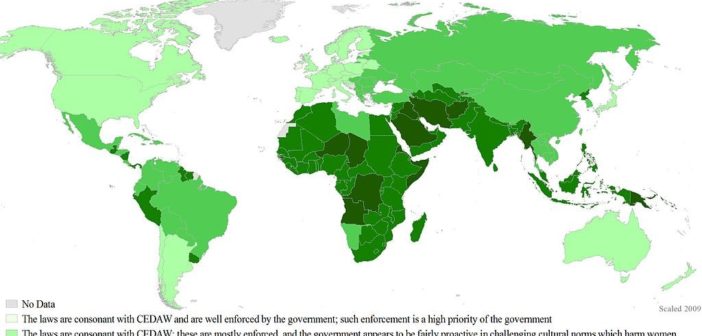[tribulant_slideshow gallery_id="58"] |
By Marie Umholtz
The Lions’ Pride is running this article in honor of Mar. being Women’s History Month.
The United States is known for its ideals and foundations of freedom and equality that strive to protect its citizens’ basic human rights. However, an article posted by CNN states that the U.S. surprisingly falls behind other countries regarding women’s rights.
CNN first discussed the Convention on the Elimination of Discrimination against Women (CEDAW), which was introduced to the United Nations in 1979. The UN’s official website explains that, if signed, CEDAW will enforce action to abolish laws that discriminate against women.
The United States was one of the seven countries that never ratified CEDAW. CNN said, “The United States is a signatory to CEDAW, but to ratify such a treaty, two-thirds of the Senate must vote in favor of it. CEDAW has never made it to the Senate floor for a vote.”
“The argument is we already have the rights in our constitution that are guaranteed,” said Dr. Allyson Marino, who is a professor of English at Saint Leo University and has studied feminist theory. “If the U.S. is seen throughout a lot of the world as a leader in human rights, it’s concerning for some activists in other parts of the world to see the U.S. not taking a lead in that where other countries have.”
Similarly, CNN said that the U.S. Constitution is one of the 32 constitutions that do not explicitly guarantee gender equality or protection against discrimination. While it may seem implied in the Equal Protection Clause of the 14th Amendment, it is not guaranteed, according to the late Supreme Court Justice Antonin Scalia. According to the article, Scalia said that the constitution does not explicitly forbid discrimination against women.
CNN contrasted this to Afghanistan, and said, “Even Afghanistan’s constitution includes equal rights provisions for women. And while they may not be enforced, says Jessica Neuwirth, founder and president of the ERA Coalition, the language offers a legal framework lawyers can use to work on behalf of women.”
However, CNN reported that many Americans, including politicians, argue that the Equal Rights Act [ERA] is not finished, and they are pushing to explicitly include women in the ERA.
CNN also mentioned that the U.S. is one of the only nine countries that does not require guaranteed maternity leave, being the only high-income, developed country that does not guarantee this.
“We’re the only industrialized nation in the world that doesn’t support paid maternity leave,” said Dr. Marino. “The reality is that many families in the United States are caught between choosing financial stability or nurturing a newborn.”
She explained that research suggests that mothers with paid maternity leave tend to be healthier and take better care of their newborns as well.
While there are economic concerns and considerations involving mandatory paid maternity leave, Marino said that paid maternity may yield long-term economic benefits.
She said, “On the economic side, arguments have been made and studies have shown that women who are given paid maternity leave are more likely to return to work, and report job satisfaction there. So that would mean less time and money spent for companies recruiting employees and retraining new employees.”
Salary-wise, the Census Bureau found that American women earned 78 percent of men’s salaries in 2013, according to CNN. CNN elaborated, CNN explained, “When it comes to paychecks, the United States ranks 65th in wage equality for similar work, according to a World Economic Forum study of 142 countries.”
Marino confirms this by stating that American women generally earn 75 to 83 cents for every dollar earned by men. She also noted that studies indicate that the wage gap is not a myth and that they want to see whether or not the wage gap is affected by sexism. She said researchers have considered factors, such as education level, and statistical data to see if the wage gap rises from women choosing part-time or lower paying jobs.
“The argument is, now that women have caught up in education levels with men to a certain extent, that women are choosing different paths than men. So they’re choosing to be the ones who stay at home for care, or they’re choosing careers that have been more traditionally aligned with female roles, such as teaching, which is lower paid than Fortune 500 companies with big executive positions,” said Marino.
Marino also thinks that people should consider why women often choose these career paths and whether women’s traditional career choices, such as teaching, should be reconsidered for higher pay.
Marino believes that career choice may also be linked to the small number of women in public office.
Rutgers University’s Eagleton Institute of Politics said, “In 2016, 105 (77D, 28R) women hold seats in the United States Congress, comprising 19.6% of the 535 members; 20 women (20%) serve in the United States Senate, and 85 women (19.5%) serve in the United States House of Representatives.”
CNN reported that these numbers are at a record high in the U.S., but then pointed out that these percentages are not very striking, as 51 percent of the population is composed of women.
CNN also said, “The U.S. Congress is ranked in 72nd place out of 139 spots (190 countries were included in the rankings, but there were nearly 50 ties).Women are represented more in Uganda, Algeria, Afghanistan, Iraq, China, Pakistan and Saudi Arabia.”
When asked how women can receive better government representation, Marino said, “I would encourage young women to know their voting rights, to be very aware of their rights, to vote—the best way for women to be involved in government positions is to access their right to vote—[and]run for office.”





